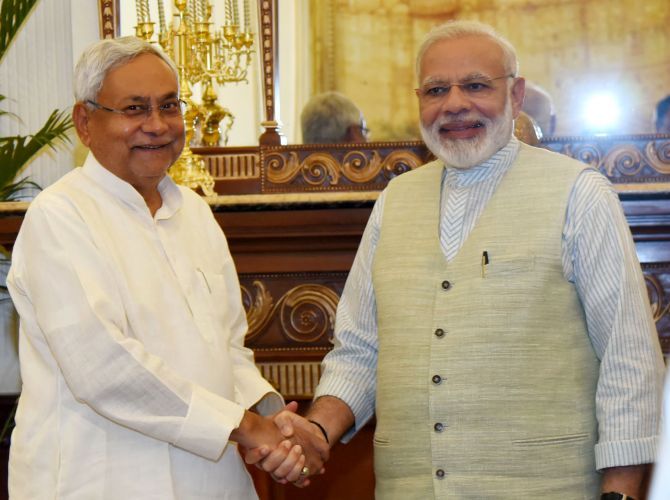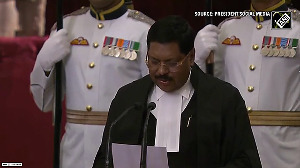'Nitish Kumar has only done what any smart politician will do in his place,' says Saisuresh Sivaswamy.

Have we just witnessed the biggest political coup in independent India?
Or have we just seen the final obsequies performed on hallowed democratic tradition, the last rites that began in Goa after the February assembly elections when a government that had lost the popular mandate sneaked back into office through some nifty legislative skulduggery?
It depends really on which side of the politico-ideological divide you stand, really.
If you are one of the cheerleaders for the party in power at the Centre, this is a defining moment in our history when an arch critic has seen the error of his ways and done amends.
If you are one of those ranged against the BJP and its leadership, decency and morality have just been murdered at the altar of politics.
But this is not the first time that morality has been given the go-by in politics, nor, we can be sure, will it be the last.
Indians are everything they are described to be, but they are also, in the final analysis, realists who have no illusions about anything. Least of politics and politicians.
Even given that wide leeway, what we have just witnessed in Bihar marks a first.
The previous instances of naked power play involved politicians who wouldn't be seen next to a principled stand leave alone embrace it.
The intelligentsia and civil society usually scorned them for their disdain for fairness, and they reciprocated the sentiment.
But Nitish Kumar was always different.
So different that even his ardent detractors sneaked in a grudging admiration for the man who, it can be said with a fair degree of accuracy, changed Bihar's face and identity. At least in popular perception if not on the ground.
Because he was different, his current turnabout, where he has re-embraced a political ally who he had kicked away only for its emerging leadership, is a little hard to explain.
Or accept.
Or, perhaps, even understand.
The Bharatiya Janata Party, with who he was in a longstanding alliance before he decided to break away in 2013, has not changed. If anything, the very leadership he had scorned four years ago has cemented its position and is today the be-all and end-all of the party.
So, it is obvious that Nitish Kumar is the one who has changed.
From being the man who had made the first move on forming a Mahagatbandhan in Bihar with his political foe Lalu Yadav to keep the rampaging BJP out of power in 2015, Nitish Kumar, by inviting that very party to share in power today, has done a pirouette to do the Bolshoi Ballet proud.
So were the last four years he spent in criticising the BJP, a time when he had emerged as the key Opposition figure in the run-up to the 2019 elections, a mistake?
Or was it all along a lie, to paint an image of himself that is at variance with the truth -- which is that there is nothing he will not do, including sleeping with the enemy, if it cements his tenure of 1 Anne Marg, Patna?
It is hard to explain Nitish Kumar's politics through conventional idioms. So to see him through the prism of secularism, communalism, liberalism, fascism, even opportunism, which is what his latest manoeuvre leans to, would be inapt, and not entirely accurate.
What Nitish Kumar has shown, throughout his long political career, is that he is out there batting not for any team, but for himself.
Does it make him a mercenary, a sellsword -- to use a term from the popular show Game of Thrones whose title could well be referencing the goings-on in Bihar?
Or does it make him a pragmatist who sees that politics is not to be spent on the Opposition benches, but in the pursuit and retention of power?
If explaining Nitish Kumar's politics was hard, it is harder to accept it but only because despite his abundant hints and indications one refused to buy that he will take the final plunge.
By doing what he did, he has shown that he is not a prisoner of the past, of political paradigms or even empty shibboleths -- unlike his contemporaries who seem to be locked in a time warp.
But the questions remain.
When did it dawn on him that political untouchability, which he had himself enshrined as his key principle when he dumped the BJP in 2013, was a currency that had long been demonetised?
When did he realise that his quondam foe Lalu was a bigger liability to Brand Nitish than the BJP?
After all, the Yadav clan's accumulation of wealth was well-known, though they had been kept in line in the two years they had shared power with him.
When 'greed', to quote Nitish, didn't matter in 2015, it cannot suddenly matter now.
Which makes it obvious that the reason for the breakup lies elsewhere.
Could it be that despite his protestations Nitish Kumar harboured other, more grand ambitions than ruling a corner of India?
After all, the Bihar Mahagatbandhan fathered by him remains the only viable template to defeat a resurgent BJP, and holds the sole hope for the Opposition ahead of 2019.
Given the eclipse of other contenders to lead such a formation, and his own popularity, Nitish Kumar surely saw himself as a serious contestant for the top job.
But it's obvious that others in the emerging Opposition ranks didn't feel the same way about him.
The Congress, despite its rout in most parts of India, was not willing to sign away its future by seconding him to lead such a formation, nor were the others going out on a limb to back him.
In such a scenario, there were only two options before him.
One, to remain confined to Bihar where the Yadav clan has made no secret of its ambition to rule the state again and was constantly breathing down his neck, even while Nitish Kumar continued to lend his heft to the opposition to take on the BJP.
Two, to dump the ballast in the ocean and forge a new path, even if it involves forging friendship with foes.
Option one is restrictive for a man with ambition, as well as uncertain given that he was the junior partner in Bihar's ruling alliance, while option two merely calls for doing something he has done before -- burying old enmities to forge new politics.
Option one means forever taking his eyes of the Dilli Sultanat, while option two calls for merely suspending his 2019 dreams, while getting a better grip on Bihar, something not possible with the Yadavs.
Nitish Kumar has only done what any smart politician will do in his place.
Live to fight another day.
IMAGE: Prime Minister Narendra D Modi with Bihar Chief Minister Nitish Kumar in New Delhi, May 27, 2017.






